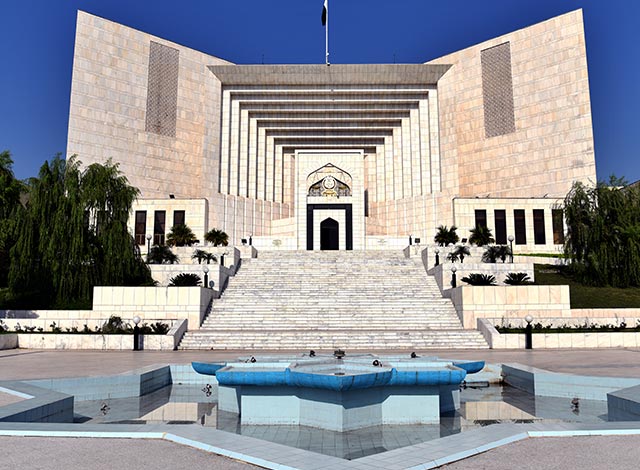ISLAMABAD: On Monday, the Supreme Court dismissed the government’s petition seeking permission for military courts to announce verdicts in civilian cases.
Justice Musarrat Hilali, a member of the seven-judge constitutional bench, remarked, “Granting permission would imply recognizing the authority of military courts.” The bench, headed by Justice Amin-Ud-Din Khan, also included Justices Jamal Khan Mandokhail, Muhammad Ali Mazhar, Syed Hasan Azhar Rizvi, Naeem Akhtar Afghan, and Shahid Bilal Hassan.
Additionally, the court rejected a petition filed by former Chief Justice Jawwad S. Khawaja, which sought to delay hearings related to the trial of civilians in military courts until the issue of the 26th Constitutional Amendment was resolved. The court imposed a fine of Rs 20,000 on Khawaja for his petition.
Justice Ayesha A. Malik did not participate in the hearing, as she had been part of the earlier bench whose judgment was under challenge, leading to her recusal from the constitutional bench.
Court Proceedings
During the hearing, the bench questioned Khawaja’s counsel, asking if he recognized the constitutional bench. The counsel responded, “I do not accept the jurisdiction of the constitutional bench.” In response, Justice Mandokhail told the counsel, “Then you may leave the courtroom.”
Khawaja’s counsel further argued that the constitutional bench had been nominated by the Judicial Commission, but Justice Mandokhail questioned whether the 26th Constitutional Amendment had been invalidated. Justice Mazhar added, “You are employing delaying tactics. At every hearing, a new request emerges.”
Justice Mazhar also pointed out that if the 26th Amendment were annulled, judicial decisions would still be safeguarded, and even those detained under military courts would prefer such a resolution.
The bench then called Hafeezullah Niazi to the rostrum, where Justice Mandokhail asked, “Do you wish to proceed with this case?” Niazi confirmed his desire to proceed, but Justice Hilali reminded him to consider those imprisoned, suggesting he lacked legal standing to pursue the case. Justice Mandokhail further emphasized that Niazi was delaying proceedings because no loved ones of his were in custody.
The bench clarified that it was operating under the framework of the constitutional amendment, explaining, “All benches are being formed under the new amendment, and even the case concerning the amendment will be heard by a bench constituted under it.”
In addition, PTI leader Salman Akram Raja, a lawyer, informed the bench that he had objections to parts of the judgment authored by Justice Munib Akhtar and intended to present his arguments.
Justice Rizvi inquired about the trial process for those involved in the Army Public School attack. Khawaja Haris, counsel for the Ministry of Defence, explained that the trial had been conducted under the 21st Constitutional Amendment, which had allowed military courts to try civilians.
The court dismissed Niazi’s request to transfer the accused to jail, and the additional attorney general argued that the trials in military courts had been completed and sought permission to announce the verdicts. However, Justice Hilali rejected this request, stating that granting such permission would effectively resolve the ongoing question of military courts’ jurisdiction over civilian trials.










